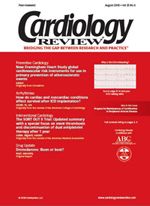Publication
Article
Cholesterol, statins, and inflammation: Cause and effect
Author(s):
Extrapolating experimental findings to humans requires one to remember 2 basic dictums: (1) drugs do a lot of stuff; and (2) animal and in vitro findings are often wrong.
Extrapolating experimental findings to humans requires one to remember 2 basic dictums: (1) drugs do a lot of stuff; and (2) animal and in vitro findings are often wrong. What human disease is not inflammatory? Bacterial pneumonia and hepatitis, 2 well-known infectious processes, clearly cause inflammatory responses. Cancers similarly cause inflammation. A white-cell response to excess accumulated arterial lipid was documented more than 50 years ago. Thus, reduction of plasma and arterial cholesterol should reduce atherosclerosis, vascular inflammation, and plasma markers of inflammation, such as C-reactive protein (CRP). Alternatively, an off-target direct effect of statin medications on macrophages, other vascular cells, or even the liver could reduce inflammatory markers even without directly modulating arterial cholesterol accumulation.
In some ways, Kinlay tries to find evidence that statin-induced cholesterol lowering has independent effects on CRP in his
meta-analysis of multiple cholesterol-lowering studies and CRP levels
. He finds little evidence for this and concludes that only 2% to 11% of the CRP-lowering resulting from a statin drug is not related to cholesterol. Because statins are far and away the most effective means to lower cholesterol, it is hard to find data sets that have a similar degree of lipid lowering by other means and, I suspect, almost no randomized trials to do this, for example, a comparison of low-density lipoprotein (LDL) apheresis and statins.
But in the real world of patient care, it does not matter. The patient with elevated LDL cholesterol and metabolic syndrome needs LDL-cholesterol reduction regardless of his or her CRP level. Some patients, especially those who regularly follow the business and popular science media, are familiar with CRP and sometimes request its measurement. They are comforted by its reduction along with LDL cholesterol; you would think that cholesterol reduction itself would evoke the same "good report card" feeling. Maybe a continued elevated CRP level can induce some patients to more actively exercise and attempt to lose weight. If this occurs, then assessing the CRP level is worth its cost.






